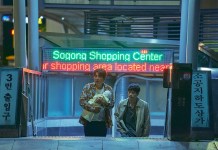Luis Ortega has added his film to the strong-contender list in this year’s Un Certain Regard section at Cannes. His film is based on the true story of Carlos Robledo Puch, a baby-faced criminal who was far from being an angel.
Set in Buenos Aires in 1971, we first see 17-year-old Carlitos (Lorenzo Ferro) breaking into a mansion. He’s all blonde curls and kiss-me-quick lips, and we fall for his cherubic features and forgive his fairly innocent pastime of burglary and petty theft. When he returns home, his mum (Cecilia Roth) worries that he is ‘borrowing’ too much stuff and his father (Luis Gnecco) wants him to put a stop to it. Nobody says the word ‘stealing’ and it is clear that this little gift from heaven is able to manipulate his parents, who refuse to acknowledge that their son is a miscreant.
At school, Carlitos meets Ramon (Chino Darín), who looks way too old to be at school (in fact he’s twenty). There is an immediate attraction between them, based on looks – Ramon is all sculpted swarthy hunkiness to Carlitos’ golden boyishness – and a mutual affinity for crime. When he takes Carlitos back to his place, we meet Ramon’s mum Ana María (Mercedes Moran) and dad Jose (Daniel Fanego). If you thought Carlitos had a dysfunctional family, wait till you meet these two: Ana María is flirtatious and dangerous, but not as dangerous as her heroin-using, gun-toting husband. When the three men get together, it is the start of a murderous coalition.
Ortega depicts 1970s Buenos Aires as a city rich in colour and steeped in venality. Carlitos’ little forays into wealthy homes show the disparities in society, while his father struggles as a travelling salesman. The police are corrupt and violent, on the lookout for terrorists and happy to indulge in a little torture. It is both an indictment of Peron’s years in power and the overture to what befell Argentina in 1976. In one scene, the partners in crime look at themselves in a mirror. Carlitos is wearing earrings and both men are wielding guns: ‘Fidel and Castro’ says one; ‘Evita and Peron’ says the other – the Perons are Argentina’s Bonnie and Clyde, and the boys are a sick caricature of them.
Ferro and Darín make a great on-screen partnership and the latter has clearly inherited not only his dad’s looks but also some of his acting skills, while Ferro’s portrayal of this psychopathic child allows us to sympathise just enough with the character in order not to be repulsed. There is a lot of humour, thanks to the script co-written by Ortega, particularly in the meeting between the boys and Jose. The parents are all excellent, as you’d expect from these stalwarts of Spanish and South American cinema, though Fanego and Moran get to steal more scenes due to the larger-than-life characters they portray.
Music is a vital element, and one particular song bookends the film. There is something a little odd about leaving a film about a mass killer humming a tune with a smile on your face, but with El Ángel, this is what Ortega achieves. It’s sexy, funny and charming, but behind all those charms lies the icy reality of a vicious boy who lived – and killed – in brutal and ugly times.









